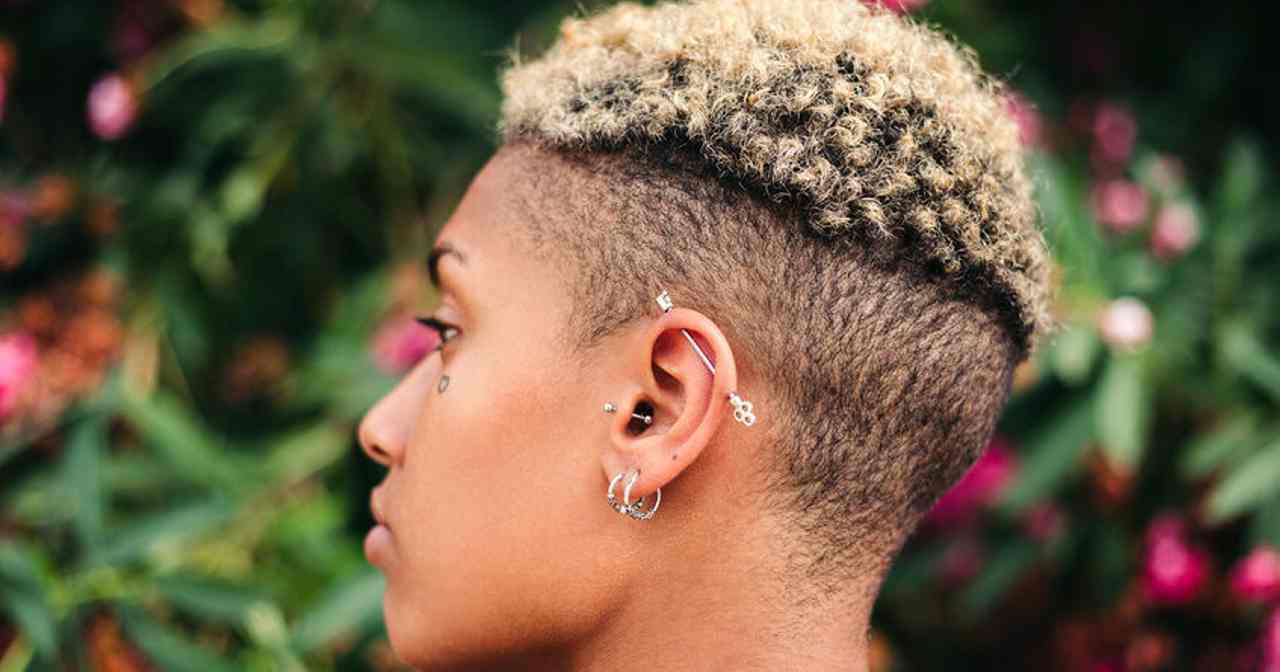Each part of your ear (and the rest of your body, ahem), have different timelines for healing from piercings. During that period, your holes can close up without proper care. You can also get nasty infections. To help you avoid those unwanted scenarios, we reached out to board-certified internal medicine physician Denise Pate, MD, and professional piercer Anke Labaere for aftercare tips and insight on how long ear (and other) piercings take to heal.
How long do ear piercings take to heal?
Healing time varies, based on where the hole is situated. Ear lobes are comprised primarily of connective tissue, areolar tissue, skin, and fat. They have a good blood supply and heal relatively quickly—around six to eight weeks.
The top and the sides of the ear, however, contain cartilage under the skin instead of fat. “Piercings in these areas (industrial and constellation piercings) take anywhere from four months to a year to heal completely,” says Dr. Pate.
What about everywhere else?
If you’re piercing other parts of your face or body, you can use this top-to-bottom healing timeline guide from our experts:
- Eyebrows: 2-3 months
- Nose: 2-3 months
- Lip and tongue: 3-4 months
- Nipples: 10-12 months
- Belly button: up to a year
- Genital piercings (male and female): varies by exact location, anywhere from 2 months to a year
How to avoid infections while it’s healing
Infections can happen during or after a piercing. The first rule of thumb is to find a reputable piercer, then check out their facilities for cleanliness, and no tell-tale “ick” factors. Make sure to ask about their sterilization process. Dr. Pate also recommends choosing piercers who only use new tools and instruments that are opened in front of you.
To eliminate the potential for an allergic reaction, your piercer will place a sterile, nickel-free, starter earring or bar in the hole. Don’t swap the starter out for at least six weeks for ear lobe piercings, and 12 weeks for cartilage piercings.
No matter where your piercing is, keep it clean and free from trauma or pressure. Dr. Pate stresses you should always wash your hands before handling a new piercing.
“Aftercare involves rotation of the ring and application of a cleansing solution, two or three times per day. If you run out of solution given by the place where you had your piercing, you can use sterile saline,” says Dr. Pate.
Labaere adds that you should avoid sleeping on new piercings (sorry, side sleepers). “For ears, avoid headphones and helmets that might put pressure on the piercing or spread germs,” she suggests.
She also mentions that swelling is to be expected, especially with industrial piercings. “Your piercer may use a long bar for industrial piercings, to leave room for extra swelling,” Labaere says. “After six to eight weeks, you will be able to go back to your piercer for a shorter bar. This will help you to avoid irritation bumps from the ends of the bar rubbing up against your skin.”
Genital piercings should only be done by people who are highly experienced and qualified to do this type of work. Your aftercare instructions may vary based on exactly where your piercing is. Cleanliness, of course, is essential. So is avoiding any type of pressure, friction, or sexual activity for the duration indicated by your piercer.
When to see a healthcare provider
Redness, clear or bloody discharge, and swelling are to be expected for a day or two after a piercing. However, it’s important to keep an eye out for signs of infection, such as:
- Excessive or worsening swelling
- More than a couple days of redness in pale-skinned people, or darker skin or a purplish-looking bruise in Black people
- Pus-filled discharge that may be yellow or green
- Pain that occurs without touching
- Throbbing
- Skin that’s warm or tender to the touch
- A fever or fatigue (signs the infection has started to spread)
You may also see signs of an allergic reaction to your starter earring. These can include itching, rash-like bumps, or even blisters in severe reactions.
To be on the safe side, Dr. Pate recommends letting your healthcare provider know about any of these symptoms. “When they examine you, your doctor may reassure you that you’re experiencing normal healing. However, it’s better to see your provider sooner rather than later, as you may need to remove the piercing and be treated with antibiotics,” she says.
Once your piercing is fully healed, you’ll be ready to show the world (or invited guests) your fabulous new look.
The Wellness Intel You Need—Without the BS You Don’t
Sign up today to have the latest (and greatest) well-being news and expert-approved tips delivered straight to your inbox.

